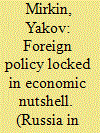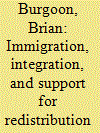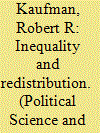|
|
|
Sort Order |
|
|
|
Items / Page
|
|
|
|
|
|
|
| Srl | Item |
| 1 |
ID:
143120


|
|
|
|
|
| Summary/Abstract |
Cunning, the art of diplomatic game, the ability to make others respect your own opinion - all have certain limits in foreign policy. Everything that can dismay or delight "partners" lies within the range of resources that a country's economy can provide.
|
|
|
|
|
|
|
|
|
|
|
|
|
|
|
|
| 2 |
ID:
110726


|
|
|
|
|
| Publication |
2011.
|
| Summary/Abstract |
The Deepwater Horizon incident demonstrated that most of the oil left is deep offshore or in other difficult to reach locations. Moreover, obtaining the oil remaining in currently producing reservoirs requires additional equipment and technology that comes at a higher price in both capital and energy. In this regard, the physical limitations on producing the ever-increasing quantities of oil are highlighted as well as the possibility of the peak of production occurring this decade. The economics of oil supply and demand are also briefly discussed showing why the available supply is basically fixed in the short to medium term. Also, an alarm bell for economic recessions is shown to be when energy takes a disproportionate amount of total consumer expenditures. In this context, risk mitigation practices in government and business are called for. As for the former, early education of the citizenry of the risk of economic contraction is a prudent policy to minimize potential future social discord. As for the latter, all business operations should be examined with the aim of building in resilience and preparing for a scenario in which capital and energy are much more expensive than in the business-as-usual one.
|
|
|
|
|
|
|
|
|
|
|
|
|
|
|
|
| 3 |
ID:
132505


|
|
|
|
|
| Publication |
2014.
|
| Summary/Abstract |
Immigration poses individual or collective economic risks that might increase citizen support for government redistribution, but it can also generate fiscal pressure or undermine social solidarity to diminish such support. These offsetting conditions obscure the net effects of immigration for welfare states. This article explores whether immigration's effects are mediated by the economic and social integration of immigrants. Integration can be conceptualized and measured as involving the degree to which immigrants suffer unemployment rates, depend on welfare-state benefits, and harbor social attitudes similarly to the native population. Such integration may alter how immigration reduces solidarity and imposes fiscal and macroeconomic pressures, but does not much alter how immigration spurs economic risks for natives. Where migrants are more integrated by such measures, immigration should have less negative or more positive implications for native support for government redistribution and welfare states than where migrants are less integrated. The article explores these arguments using survey data for twenty-two European countries between 2002 and 2010. The principal finding is that economic integration, more than sociocultural integration, softens the tendency of immigration to undermine support for redistributive policies.
|
|
|
|
|
|
|
|
|
|
|
|
|
|
|
|
| 4 |
ID:
098229


|
|
|
| 5 |
ID:
121589


|
|
|
|
|
| Publication |
2013.
|
| Summary/Abstract |
Even before the sharp downturn that began in 2007, many Americans were concerned about economic risks. Yet this widespread public concern has not been matched by attention from political scientists regarding how citizens experience and understand the economic risks they face or how those experiences and understandings shape their views of public policy. We develop here an argument about the role of personal economic experiences in the formation of policy attitudes that we validate using a distinctive opinion survey of our own design, fielded not long after the onset of the Great Recession. The survey tracks citizens' economic experiences, expectations, and policy attitudes within multiple domains of risk (employment, medical care, family, and wealth arrangements). These investigations show that economic insecurity systematically and substantially affects citizens' attitudes toward government's role. Citizens' economic worries largely track exposure to substantial economic shocks. Citizens' policy attitudes in turn appear highly responsive to economic worries, as well as to the experience of economic shocks-with worries and shocks creating greater support for government policies that buffer the relevant economic risk. Attitudes seem most affected by temporally proximate shocks, shocks befalling households that have weak private safety nets, and shocks occurring within the domain most relevant to the policy in question, though attitudes are also (more weakly) correlated with shocks in other domains. The magnitude of these associations rivals partisanship and ideology and almost always exceeds that for conventional measures of socio-economic status. Given the long-term increase in economic insecurity and current sluggish recovery, understanding how insecurity shapes citizens' policy attitudes and political behavior should be a major concern of political science.
|
|
|
|
|
|
|
|
|
|
|
|
|
|
|
|
|
|
|
|
|